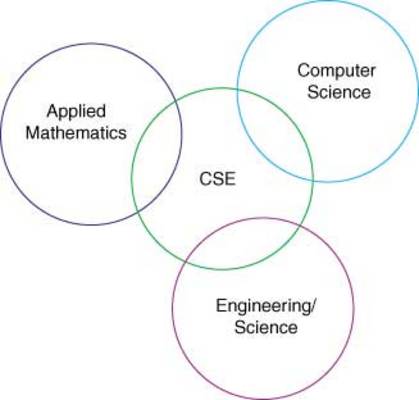Computational Science and Engineering (CSE)
Credit: The Council on Competitiveness, July 2005 |
CSE is also known as High Performance Computing (HPC) when the utilized computers approach the teraflops-region. From medicine to consumer products, from energy security to aerospace, this trailer video illustrates the importance of HPC in breakthrough innovation, and demonstrates the need for continued funding and support. The trailer video reveals how HPC is behind many of the products and services that we take for granted in everyday life. More than 30 organizations contributed to the feature video, including industrial HPC users, HPC manufacturers, software developers, universities and national laboratories [1]. |
What is CSE?
Career prospects for CSE Graduates
|
CSE graduates experience a much broader training in theoretical and computational methods than graduates of the traditional programs. This broad education greatly enhances the flexibility of the graduates at the time of choosing a career [2]. Some examples for career paths are: |
|
Banking and insuranceBoth for insurance companies and for private and public banks the computer-based evaluation of math finance models plays an increasingly important role. In both cases the simulation of stochastic processes is of interest, for instance for estimating the probability for the occurrence of damage, the compilation of risk profiles for portfolios or the determination of the fair value of derivatives and the associated risk hedging by suitable counter transactions [2]. |
Credit: NVIDIA, 2009 |
|
Basic scienceIn basic research, computer simulations and numerical modeling are not only relevant for the theoretical branches of brain research, biochemistry, geoscience, and biophysics, but also for the design of large scale experiments in astrophysics and cosmology [2]. |
Credit: NASA/Goddard Space Flight Center, April 2011 |
|
BiologyCSE technologies are rapidly becoming indispensable to the biological and medical sciences. Simulation plays a major role in the conceptual development of medical devices, both those used in diagnostic procedures (electromagnetic, ultrasonic, etc.) and in design of artificial organs (hearts, kidneys, etc.) [3]. |
Credit: Emory University, 2009 |
|
Weather and climate predictionFuture energy and environmental strategies will require unprecedented accuracy and resolution for understanding how global changes are related to events on regional scales where the impact on people and the environment is the greatest [3]. |
Credit: NASA/Goddard Space Flight Center, June 2010 |
How to become a CSE Professional
|
The official designation of a computational science (CSE) program may be different across institutions, but the overall structure is very similar. The most common flavors of undergraduate computational science programs in the U.S. include:
One way to characterize the similarities of the programs is to examine the number and type of courses. In fact, almost all of the above flavors of undergraduate CSE programs include a common core or collection of courses in: Calculus (2 course sequence ); Programming (at least one course); Introduction to Modeling-Simulation (or Computational Modeling); Numerical Analysis (or Scientific Computing); and either a course in Visualization or a more advanced course in Computational Modeling. Another common feature of most CSE programs is the requirement for an internship in the form of an undergraduate research experience. All existing CSE programs recognize the importance of independent research by undergraduates since such experience provides the opportunity for a student to work (over a semester, summer or for a longer period of time) on a real-world problem with either a faculty or an industry mentor. These research experiences are being implemented as single or team-based projects and include some form of written or oral presentation on campus or at a professional conference [3]. A list of undergraduate and graduate programs in CSE is available at http://hpcuniversity.org/students/universityPrograms/ |
Development of CSE
|
Up to early 20th century, mankind had to rely on mathematical analysis and was very successful in giving birth to basic theories like electrodynamics, quantum mechanics, and quantum chromodynamics. However, models for nonlinear physics such as fluid dynamics, nuclear interactions, and phenomena involving many variables like phase transitions and nanoengineering are too complex to be handled analytically. The mathematical complexity became a problem for the rapid advance in such scientific fields. During the late 20th century, the adoption of computers in the mainstream added tremendous leverage as tools to provide insight through simulation. The intellectual challenge to the present and the next generations of scientists and engineers is to achieve innovations and make breakthroughs at the frontiers of science and technology:
At very small scales, computer simulations can be used instead of actual experiments, which tend to be very expensive or impossible to arrange. Similarly at the very large scales, simulation is often the only feasible approach as it is not practical to use experiments at all. In the case of very complex processes there is often no agreed mathematical model or the available models are not amenable to analytical solution. In such cases, CSE allows rapid development of models and testing of hypotheses. Generally, computer simulations are often preferred as they allow to investigate the impact of varying model parameters and initial conditions, as well as providing meaningful visualizations of extremely complex data. In addition to making fundamental advances in the sciences, CSE has been used successfully in industry in the development of new products. The private industry has reduced research and development costs by using CSE to streamline their operations, which in turn provides them with a competitive advantage that allows them to expand their markets and increase their revenue. |
 |
|
 |
|
 |
|
 |
|
 |
XSEDE Code of Conduct
|
Not Logged In. Login
|
XSEDE Code of Conduct
|
Not Logged In. Login